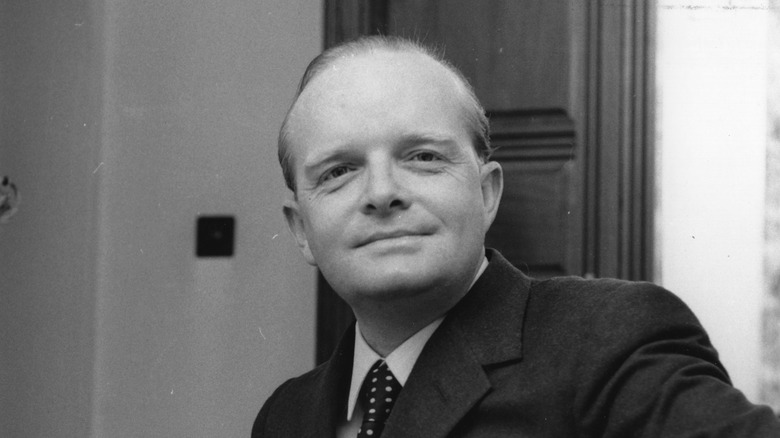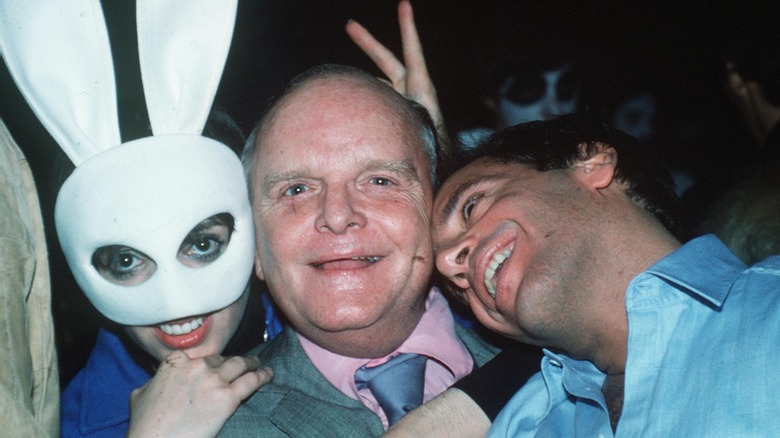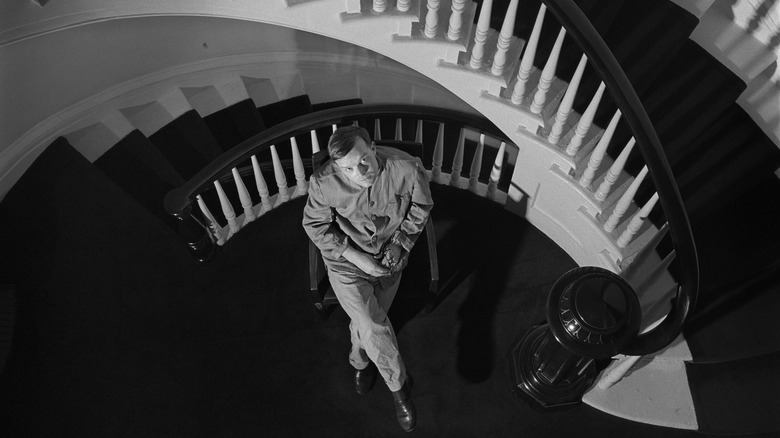The Grim Details Of Truman Capote's Death
Truman Capote, the author of such classic books as "Breakfast at Tiffany's" and "In Cold Blood," died in his sleep. In his 59 years the Southern writer who had been abandoned by his mother for several years as a child had by the end achieved fame and fortune. But his long-standing alcohol and drug dependency had squelched his brilliance and shattered his health. "I think it's criminal what you're doing to the talent you've got," one of Capote's doctors told him a few months before the end came (via "Capote: A Biography"). On August 25, 1984, Capote died in a guest room of the Bel Air mansion of his friend Joanne Carson, the ex-wife of the king of late-night television Johnny Carson.
The Los Angeles Police and the coroner initially didn't know what had killed Capote, but they were fairly sure murder wasn't the cause. "Detectives and coroner's investigators are at the scene, although we have absolutely no evidence that foul play was involved," an LAPD commander told the Daily News at the time. Even after an hours-long autopsy, the cause of Capote's death was considered inconclusive and the coroner had to conduct further tests to determine what had killed the writer. The coroner eventually determined the cause of death as liver disease complicated by the inflammatory vein disease phlebitis and multiple drug intoxication per the Associated Press.
Died at the home of Joanne Carson
In the months before Truman Capote's sudden death, he had been suffering from various health issues. He took two bad spills, one that caused a concussion, and spent time in hospitals on both coasts. He had blood clots in his lungs, and a painfully swollen left leg from the phlebitis. The pain was bad enough for him to stop drinking alcohol for a time. "They were sitting around at Alcoholics Anonymous in heaven and asked what they could do to make me stop drinking," he joked. "This disease was it" (via Capote: A Biography). But he eventually returned to drinking.
In August 1984, he flew to Los Angeles to stay with Joanne Carson. He continued working on "Answered Prayers," the novel he'd spent his last 20 years writing. Just before noon on August 25, Carson came in to wake Capote to go for a swim. "She noticed his color was pale and attempted to find a pulse, but couldn't find one," an LAPD spokesman told the Daily News. Paramedics pronounced him dead at the scene. Carson would later admit to author Gerald Clarke for his book "Capote: A Biography" that she had lied to the police and press. That morning, she went to wake Capote up at about 7:30 a.m., and she noticed he looked pale. Carson wanted to call the paramedics but the writer refused. He pulled her close and "for the next three and possibly four hours he talked and talked, until he could talk no longer."
A long history of drug and alcohol dependency
When investigators searched Truman Capote's room they found several prescription bottles. Capote had been open about his penchant for combining alcohol and prescription drugs. "I put them together like some sort of cocktail," he once told an interviewer. Besides overusing alcohol, the author was a heavy smoker and regularly threw cocaine into the pharmaceutical mix, making for a dangerous combination. Over the years he attempted to get sober but continued to relapse.
In a 1968 interview, he discussed smoking marijuana and taking LSD, as well as his use of alcohol. "I think drink is the worst thing that can happen to any writer," he said (via YouTube). "Any writer that becomes at all used to drinking to help them, they're going to end up really badly." Even so, he admitted he sometimes drank when working. By the early 1980s, both his health and his output had greatly declined even as he remained in the public eye.
Surprising results
Given Truman Capote's long history with alcohol, when the coroner had completed looking into what killed the writer, the investigation found no alcohol in Capote's system at the time of his death. Even the drugs found in his system — barbiturates, Valium, painkillers, and anti-seizure medication — were considered within medically prescribed limits. "The drug levels, although contributory, were not lethal and indicated regular usage in accordance with his past medical history," the coroner determined (via UPI). If not for Capote's other medical issues, the prescription drugs wouldn't "have been a contributory problem."
Besides liver disease and phlebitis, the coroner found evidence of epilepsy, infections in both legs, and emphysema. "He essentially died of natural causes," a coroner's office spokesman told the news agency. Perhaps during Capote's final days, as he worked on his unfinished book he hoped would be his greatest, he'd been able to stay sober. But it was too late.
If you or anyone you know needs help with addiction issues, help is available. Visit the Substance Abuse and Mental Health Services Administration website or contact SAMHSA's National Helpline at 1-800-662-HELP (4357).



